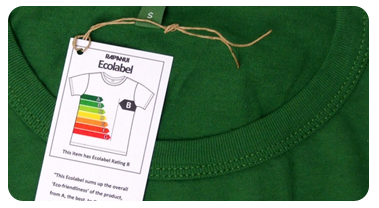Rapanui believes their Eco labelling and traceability campaigns have proved useful as methods of brand building and as a PR hook.
Eco Labelling Clothing 
Eco-labelling: Just as your crisps tell you they have high fat or salt content, or your light bulbs tell you if they're efficient or not, Rapanui thinks the high street should clearly, honestly tell you how clothing is made.
Some clothes might have an organic, or eco friendly logo on them, but it’s hard to tell, when you look at all the different labels (and the fine print) what is the impact they are making on environment. So at Rapanui, they’ve come up with a solution.
They propose that an independent organization to take all the complexities in the labelling, specifications and small print of clothing and rounded it all up into a simple grading that lets consumers shop quickly, with a conscience.
That’s Ecolabelling, a simple A-G rating in the same style as the highly successful EU energy rating label. Rapanui developed the idea and petitioned Number 10 to enforce it in 2008.
Since then Rapanui has gained national recognition in newspapers and awards ceremonies, whilst their ecolabelling system (and variations of it) have been adopted by major high-street brands in the UK. Thus, Rapanui’s ecolabelling initiative has made a difference,
Why is Ecolabelling needed?
A very few people understand where clothing comes from, and how it is made - not just customers, but fashion companies too.
Without a clear, independent and regulated system to quickly and simply classify sustainability or otherwise of clothing, choosing sustainably is impossible.
Rapanui’s ecolabelling system makes the consumer-powered transformation of the clothing industry possible. Furthermore, the easy visual identification is compatible with the market now - it’s fast, it’s easy and it’s free.
By simply by placing an A-G rated label on the normal swing tag, it is possible to turn a whole industry around.
How are the ratings defined?
Broadly, this is how the labels should be viewed.
• A - organic ethical sustainable
• B - ethical with some work to sustainable
• C - ethical
• D - not bad, not good either
• E - needs improving
• F - some organic, ethical or sustainable
• G - not organic, ethical or sustainable

|